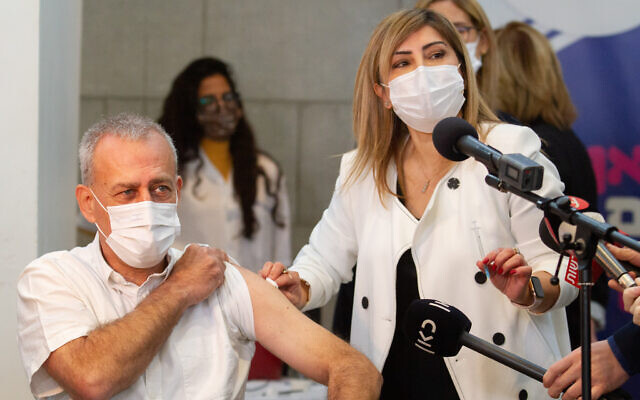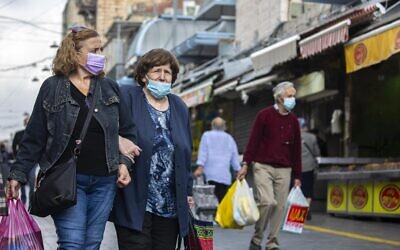PM asserts that lockdown, combined with vaccination campaign, can make Israel the 1st country to overcome coronavirus crisis

As Israel prepared to enter a highly unpopular third national lockdown Thursday, Prime Minister Benjamin Netanyahu made the bold claim that the Jewish state could be the first in the world to overcome the pandemic.
“I want to tell you that the combination of the marvelous vaccine campaign on the one hand, and a short and quick lockdown on the other, is allowing us to get out of the coronavirus [pandemic],” Netanyahu said in a statement.
“And we’ll likely be the first country to get out of [it], within a few weeks,” he added.
No other world leader has made such an assertion, and many have warned the pandemic will potentially take months more to defeat.
Netanyahu said he hopes up to 100,000 Israelis will be vaccinated every day by next weekend.
Sixty-five thousand Israelis were vaccinated on Wednesday, and the Health Ministry is aiming by next week to be vaccinating 100,000 Israelis per day.
Israel is currently second in the world in vaccinations per capita, according to the University of Oxford-run Our World in Data.
Israel began administering shots to medical staff on Sunday and to Israelis over 60 years old from Monday. As of Thursday evening, 180,000 Israelis had received the first dose. Hospitals are set to join the effort next week, ramping up the campaign, with the prime minister and health officials saying Israel aspired to become the first country in the world to achieve herd immunity against COVID-19.
Health Minister Yuli Edelstein on Thursday said the vaccines will soon be made available to people of all ages.

“In under a month, in a week or two, the vaccines will be opened to the young population as well,” he told Army Radio.
Despite success with the vaccine campaign, the government early Thursday announced a national lockdown to take effect Sunday in order to curb a resurgence of COVID-19. The new lockdown will begin at 5 p.m. and last for at least two weeks. The restrictions will be extended for an additional two weeks if morbidity rates do not decrease significantly — a likely scenario according to health officials.
Hours before Netanyahu’s comments, coronavirus czar Nachman Ash said that Israel’s third nationwide lockdown would likely be extended beyond the proposed two weeks to further drive down COVID-19 infections, but, like the prime minister, predicted the closure would be the last before the pandemic is successfully brought under control by the vaccination drive.
“Two weeks is too short. I estimate we will need to extend the lockdown,” said Ash in an interview with Army Radio.
“I truly believe this will be our last lockdown,” he said, adding that the effects of the vaccination campaign will begin to be felt when the restrictions are eased.

The lockdown rules will bar Israelis from entering another person’s home, except for immediate family members; restrict movement to 1 kilometer from home, with exceptions, such as for vaccinations; shut down commerce, leisure and entertainment; limit public transportation to 50 percent capacity; and limit workplaces that do not deal with customers face-to-face to 50% capacity.
Restaurants will be allowed to make deliveries, but takeout orders will be banned. Gatherings will be restricted to 20 people outdoors and 10 indoors, and individual sports activities, such as jogging, will be allowed.
The terms are similar to the last lockdown in September. In contrast to previous lockdowns however, the education system will continue to function for grades 1-4, 11-12 and kindergartens.
The lockdown announcement came as the number of new infections surged to over 3,000 cases per day for the last several days, and as fears grow of a new, more transmissible variant of the virus originating in the UK.

Israel’s two previous lockdowns, in April and September, succeeded in bringing down infection numbers, but morbidity ballooned again as the closures were rolled back.
The new lockdown is aimed, in part, at ensuring that a British strain of the coronavirus, which is believed to be more contagious, does not spread in Israel. On Wednesday, officials said the new variant had been found in five people in the country.
A new rule went into effect Wednesday night ordering all Israelis arriving from abroad to quarantine at state-operated and specifically designated hotels. Previously, Israelis requiring quarantine after returning from countries with high infection rates could self-isolate in their own homes.
Israel has seen 389,501 total virus cases since the start of the pandemic. As of Thursday night, there were nearly 31,716 active cases, with 526 people in serious condition. The death toll stood at 3,170.
As reported by The Times of Israel
